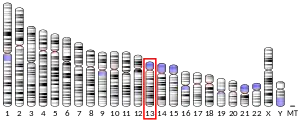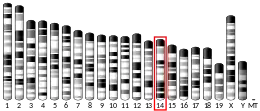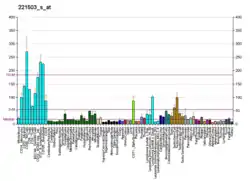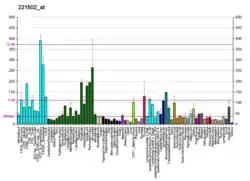Importin subunit alpha-4
Importin subunit alpha-4 also known as karyopherin subunit alpha-3 is a protein that in humans is encoded by the KPNA3 gene.[5][6]
| KPNA3 | |||||||||||||||||||||||||||||||||||||||||||||||||||
|---|---|---|---|---|---|---|---|---|---|---|---|---|---|---|---|---|---|---|---|---|---|---|---|---|---|---|---|---|---|---|---|---|---|---|---|---|---|---|---|---|---|---|---|---|---|---|---|---|---|---|---|
| Identifiers | |||||||||||||||||||||||||||||||||||||||||||||||||||
| Aliases | KPNA3, IPOA4, SRP1, SRP1gamma, SRP4, hSRP1, karyopherin subunit alpha 3 | ||||||||||||||||||||||||||||||||||||||||||||||||||
| External IDs | OMIM: 601892 MGI: 1100863 HomoloGene: 20520 GeneCards: KPNA3 | ||||||||||||||||||||||||||||||||||||||||||||||||||
| |||||||||||||||||||||||||||||||||||||||||||||||||||
| |||||||||||||||||||||||||||||||||||||||||||||||||||
| |||||||||||||||||||||||||||||||||||||||||||||||||||
| |||||||||||||||||||||||||||||||||||||||||||||||||||
| |||||||||||||||||||||||||||||||||||||||||||||||||||
| Wikidata | |||||||||||||||||||||||||||||||||||||||||||||||||||
| |||||||||||||||||||||||||||||||||||||||||||||||||||
The transport of molecules between the nucleus and the cytoplasm in eukaryotic cells is mediated by the nuclear pore complex (NPC) which consists of 60–100 proteins and is probably 120 million daltons in molecular size. Small molecules (up to 70 kD) can pass through the nuclear pore by nonselective diffusion; larger molecules are transported by an active process. Most nuclear proteins contain short basic amino acid sequences known as nuclear localization signals (NLSs). KPNA3, encodes a protein similar to certain nuclear transport proteins of Xenopus and human. The predicted amino acid sequence shows similarity to Xenopus importin, yeast SRP1, and human RCH1 (KPNA2), respectively. The similarities among these proteins suggests that karyopherin alpha-3 may be involved in the nuclear transport system.[7]
References
- GRCh38: Ensembl release 89: ENSG00000102753 - Ensembl, May 2017
- GRCm38: Ensembl release 89: ENSMUSG00000021929 - Ensembl, May 2017
- "Human PubMed Reference:". National Center for Biotechnology Information, U.S. National Library of Medicine.
- "Mouse PubMed Reference:". National Center for Biotechnology Information, U.S. National Library of Medicine.
- Takeda S, Fujiwara T, Shimizu F, Kawai A, Shinomiya K, Okuno S, Ozaki K, Katagiri T, Shimada Y, Nagata M, Watanabe T, Takaichi A, Kuga Y, Suzuki M, Hishigaki H, Takahashi E, Shin S, Nakamura Y, Hirai Y (June 1997). "Isolation and mapping of karyopherin alpha 3 (KPNA3), a human gene that is highly homologous to genes encoding Xenopus importin, yeast SRP1 and human RCH1". Cytogenet Cell Genet. 76 (1–2): 87–93. doi:10.1159/000134521. PMID 9154134.
- Nachury MV, Ryder UW, Lamond AI, Weis K (February 1998). "Cloning and characterization of hSRP1 gamma, a tissue-specific nuclear transport factor". Proc Natl Acad Sci U S A. 95 (2): 582–7. Bibcode:1998PNAS...95..582N. doi:10.1073/pnas.95.2.582. PMC 18463. PMID 9435235.
- "Entrez Gene: KPNA3 karyopherin alpha 3 (importin alpha 4)".
- Köhler, M; Speck C; Christiansen M; Bischoff F R; Prehn S; Haller H; Görlich D; Hartmann E (November 1999). "Evidence for distinct substrate specificities of importin alpha family members in nuclear protein import" (PDF). Mol. Cell. Biol. UNITED STATES. 19 (11): 7782–91. doi:10.1128/mcb.19.11.7782. hdl:11858/00-001M-0000-0015-3C39-0. ISSN 0270-7306. PMC 84838. PMID 10523667.
Further reading
- Bukrinsky MI, Haffar OK (2004). "HIV-1 nuclear import: in search of a leader". Front. Biosci. 2 (4): d578–87. doi:10.2741/A213. PMID 9366553.
- Bukrinsky MI, Haffar OK (1998). "HIV-1 nuclear import: matrix protein is back on center stage, this time together with Vpr". Mol. Med. 4 (3): 138–43. doi:10.1007/BF03401911. PMC 2230352. PMID 9562972.
- Bukrinsky MI, Sharova N, Dempsey MP, et al. (1992). "Active nuclear import of human immunodeficiency virus type 1 preintegration complexes". Proc. Natl. Acad. Sci. U.S.A. 89 (14): 6580–4. Bibcode:1992PNAS...89.6580B. doi:10.1073/pnas.89.14.6580. PMC 49545. PMID 1631159.
- Sharova N, Bukrinskaya A (1991). "p17 and p17-containing gag precursors of input human immunodeficiency virus are transported into the nuclei of infected cells". AIDS Res. Hum. Retroviruses. 7 (3): 303–6. doi:10.1089/aid.1991.7.303. PMID 2064827.
- Di Marzio P, Choe S, Ebright M, et al. (1996). "Mutational analysis of cell cycle arrest, nuclear localization and virion packaging of human immunodeficiency virus type 1 Vpr". J. Virol. 69 (12): 7909–16. doi:10.1128/JVI.69.12.7909-7916.1995. PMC 189735. PMID 7494303.
- Gallay P, Swingler S, Song J, et al. (1995). "HIV nuclear import is governed by the phosphotyrosine-mediated binding of matrix to the core domain of integrase". Cell. 83 (4): 569–76. doi:10.1016/0092-8674(95)90097-7. PMID 7585960.
- Freed EO, Englund G, Martin MA (1995). "Role of the basic domain of human immunodeficiency virus type 1 matrix in macrophage infection". J. Virol. 69 (6): 3949–54. doi:10.1128/JVI.69.6.3949-3954.1995. PMC 189124. PMID 7745752.
- Gallay P, Swingler S, Aiken C, Trono D (1995). "HIV-1 infection of nondividing cells: C-terminal tyrosine phosphorylation of the viral matrix protein is a key regulator". Cell. 80 (3): 379–88. doi:10.1016/0092-8674(95)90488-3. PMID 7859280.
- von Schwedler U, Kornbluth RS, Trono D (1994). "The nuclear localization signal of the matrix protein of human immunodeficiency virus type 1 allows the establishment of infection in macrophages and quiescent T lymphocytes". Proc. Natl. Acad. Sci. U.S.A. 91 (15): 6992–6. Bibcode:1994PNAS...91.6992V. doi:10.1073/pnas.91.15.6992. PMC 44324. PMID 8041734.
- Heinzinger NK, Bukinsky MI, Haggerty SA, et al. (1994). "The Vpr protein of human immunodeficiency virus type 1 influences nuclear localization of viral nucleic acids in nondividing host cells". Proc. Natl. Acad. Sci. U.S.A. 91 (15): 7311–5. Bibcode:1994PNAS...91.7311H. doi:10.1073/pnas.91.15.7311. PMC 44389. PMID 8041786.
- Bukrinsky MI, Haggerty S, Dempsey MP, et al. (1993). "A nuclear localization signal within HIV-1 matrix protein that governs infection of non-dividing cells". Nature. 365 (6447): 666–9. Bibcode:1993Natur.365..666B. doi:10.1038/365666a0. PMC 9524217. PMID 8105392. S2CID 25678.
- Maruyama K, Sugano S (1994). "Oligo-capping: a simple method to replace the cap structure of eukaryotic mRNAs with oligoribonucleotides". Gene. 138 (1–2): 171–4. doi:10.1016/0378-1119(94)90802-8. PMID 8125298.
- Dubrovsky L, Ulrich P, Nuovo GJ, et al. (1996). "Nuclear localization signal of HIV-1 as a novel target for therapeutic intervention". Mol. Med. 1 (2): 217–30. doi:10.1007/BF03401569. PMC 2229944. PMID 8529100.
- Gallay P, Stitt V, Mundy C, et al. (1996). "Role of the karyopherin pathway in human immunodeficiency virus type 1 nuclear import". J. Virol. 70 (2): 1027–32. doi:10.1128/JVI.70.2.1027-1032.1996. PMC 189908. PMID 8551560.
- Bukrinskaya AG, Ghorpade A, Heinzinger NK, et al. (1996). "Phosphorylation-dependent human immunodeficiency virus type 1 infection and nuclear targeting of viral DNA". Proc. Natl. Acad. Sci. U.S.A. 93 (1): 367–71. Bibcode:1996PNAS...93..367B. doi:10.1073/pnas.93.1.367. PMC 40239. PMID 8552640.
- Sato A, Yoshimoto J, Isaka Y, et al. (1996). "Evidence for direct association of Vpr and matrix protein p17 within the HIV-1 virion". Virology. 220 (1): 208–12. doi:10.1006/viro.1996.0302. PMID 8659115.
- Popov S, Dubrovsky L, Lee MA, et al. (1996). "Critical role of reverse transcriptase in the inhibitory mechanism of CNI-H0294 on HIV-1 nuclear translocation". Proc. Natl. Acad. Sci. U.S.A. 93 (21): 11859–64. Bibcode:1996PNAS...9311859P. doi:10.1073/pnas.93.21.11859. PMC 38149. PMID 8876228.
- Freed EO, Englund G, Maldarelli F, Martin MA (1997). "Phosphorylation of residue 131 of HIV-1 matrix is not required for macrophage infection". Cell. 88 (2): 171–3, discussion 173–4. doi:10.1016/S0092-8674(00)81836-X. PMID 9008157.
- Gallay P, Hope T, Chin D, Trono D (1997). "HIV-1 infection of nondividing cells through the recognition of integrase by the importin/karyopherin pathway". Proc. Natl. Acad. Sci. U.S.A. 94 (18): 9825–30. Bibcode:1997PNAS...94.9825G. doi:10.1073/pnas.94.18.9825. PMC 23276. PMID 9275210.





